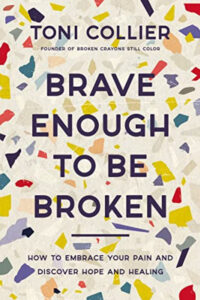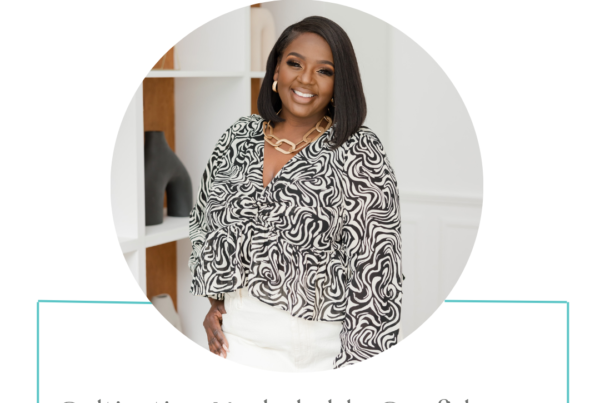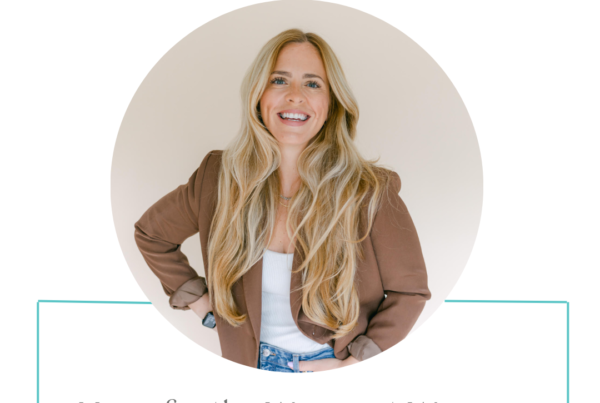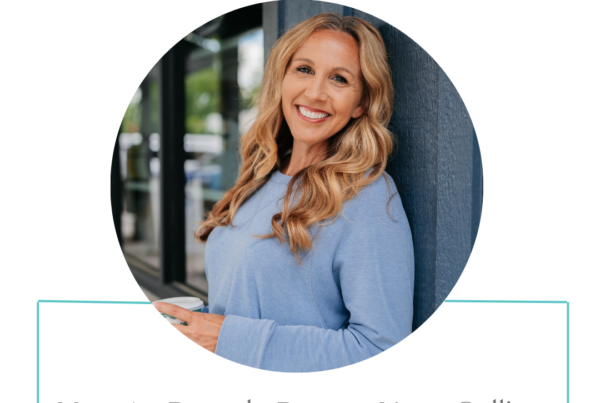Have you struggled with shame or ever felt like you were beyond redemption? Today, our guest Toni Collier joins Allie Marie Smith to discuss how you can find bravery and beauty when you have been broken in your own story. Utilizing her own life as an example, Toni shows us there is always hope.
Toni is the author of “Brave Enough to Be Broken: How To Embrace Your Pain and Discover Hope and Healing” and the Founder of Broken Crayons Still Color International Ministry.
Alllie and Toni discuss:
- How through breaking and coming to God we can become more beautiful and whole
- How joy and suffering are made to coexist
- Why we don’t have to tidy ourselves up to be loved
- Vulnerability remorse how to protect the sacredness of your story
- Embrace the right Friendship Circles
- Toni’s advice to the girl who feels broken and ashamed
Join our community for encouragement:
https://view.flodesk.com/pages/60eddc9bc92867fc75819353
Get this episode’s show-notes:
https://wonderfullymade.org/podcast/
Browse our website for more inspiring content:
https://wonderfullymade.org/podcast/
Get your copy of “Wonderfully Made: Discover the Identity, Love, and Worth You Were Created For” by Allie Marie Smith.
—
Watch the episode here
Listen to the podcast here
The Bravery And Beauty Of Being Broken – With Toni Collier And Allie Marie Smith
We are so glad that you’re here. If you are new, welcome to our community of girls. We just want this to be a place where you can exhale, be your authentic self, put the pretending aside, and know that you are not too much or not enough and that your brokenness is welcome here. In this episode, we are going to be talking about the bravery that comes from showing up as our true selves in God, even when we feel like we are so broken that we will never be able to find wholeness and healing. Our guest is our new friend, Toni Collier. Welcome.
I’m so glad to be here.
Toni is an author and a speaker. She is the Founder of Broken Crayons Still Color. It is an international women’s ministry that helps women process their brokenness and reclaim hope in their lives. She is the author of the book, Brave Enough to Be Broken. How are you doing?
I am doing great. This is my first time not having my pajamas on, showing up, and doing something, so I feel good.
I want to dive into your story. We go deep here pretty quickly right into it. I’ve been enjoying your book. You start with your story and open with this raw description of your life, the rock bottom of where you were. I’d like you to share that story with us. Many of us can relate that when we are so broken, we feel unworthy or unqualified to have a life of meaning and purpose. Can you take us back to your story, to your rock bottom?
What’s interesting is when I wrote the first chapter of the book, I could have written all about my story, starting from being from Houston, Texas, the best state in the world, from growing up in a blended family, my mom being sick growing up and having to be a caregiver at a young age, and how that all exposed me to so much on protection, safety, and all the things.
Instead, when I wrote the book, I talked about the moment when I hit rock bottom after all of that. I was 25 years old. I was a single mom. I was so broke. The thing that brought me to rock bottom is the realization that I had been through all of this pain, trauma, sexual abuse, manipulation, eating disorders, and a toxic marriage ending in divorce. I was in a church that was very spiritually abusive and all these different things.
What hurt me the most was the realization that maybe I wasn’t worthy enough for protection. Maybe I wasn’t worthy enough to not be verbally abused by my dad and my ex-husband. I remember pleading with God to take the pain away. For the first time, I started to actually face some of the things that I’ve been through.
For many years, I’ve just been numbing, going through the motions, pretending that everything was okay, playing pretend on social media, standing up on stage as a ministry, and acting like it was all good. When I started to be brave enough to face the reality that my life wasn’t perfect for real, that was one of the most painful moments. People say the healing journey is not linear and is extremely painful. It’s the truth. When we have to face the fact that we’ve been through all of these hard things, then we start to question this idea, “Are we made for good things? Is God looking out for us?” That was probably my most painful moment.
When you talk about numbing out, can you share a little bit more specifically about what that looks like for you? Speak to the woman who feels like she’s checking out. She’s numbing out with all the things. I want to hear a little bit more about what that looked like for you in your life and speak to that woman.
Here’s the truth. Our numbing for whatever that is, whether that be pushing our emotions aside and maybe going shopping, a little Netflix and chill, whatever our numbing is and whatever we’re using, the truth is not to be so condemned by it. I was embarrassed and ashamed. When I started to numb, I numbed with alcohol at 13 and 14 years old, weed, different types of drugs, and popping X in college. I then resorted to an eating disorder because it made me feel like I had control over my body.
When I first realized that, “It’s numbing. This is crazy. You need to get yourself together,” I was harsh on myself. What I realize is that I was only numbing because I wanted to feel safe, be seen, be secure, and be soothed. It was my body’s way of trying to find something that would make me feel better and more hope-filled.
I’d say to the woman that’s reading, have some grace with yourself because what you’re longing for is goodness. It is all the things that God has purposed for us to feel seen, safe, and secure, but have the grit to say that you’re going to go through whatever is needed, to be brave and courageous enough to face the thing, and then heal from the thing, and then not have to numb anymore.
Do you have a moment looking back on your story that you remember where you were? What changed the trajectory of your life when you said, “This is going to be a lot of work. This is going to be hard. This is going to take a lot of courage.” What was that point like for you? How did you find that string to lean into and deal with all the things and do that deep soul work?
The truth is, back in this moment that I’ll talk about in a second, I didn’t have enough confidence and security in myself to change. What got me was that I had a daughter. In my first marriage, I had a daughter. I remember seeing fear in her eyes for the first time and deciding that we needed to have a safer and more peace-filled life, getting out of the marriage, and becoming a single mom.
I remember looking into her eyes and promising myself and her, even though she was one year old and had no idea what was going on, that I would do everything in my power to give her not more materialistic things but a healthier life than I had. It started with the awareness of the situations I had gotten myself into by my own childhood wounds.
Oftentimes as victims of abuse, it’s very difficult for us to see the red flags and the consistencies that we brought into the situation. It’s not to belittle the abuse and to let anyone off the hook, but it is to say that our healing is our responsibility. It’s ours. We get to own it. It’s the one thing that nobody can take away from us.
I had to look back and say, “How did I get into an abusive marriage? How did I get into an abusive church situation? What is happening here?” The consistency was when I was just a little girl, these seeds were planted by my own dad that I wasn’t worthy enough to be spoken to with kindness, patience, and peace, and I was unworthy of every good thing. I felt like it was all I deserved. It was to be with a man who said he loved me but didn’t actually show it, and hurt me more than anything.
It was the moment when I looked my daughter in the eyes and wanted to promise a better life. When I look back now, I would encourage people that are reading to find for themselves the grit, confidence, and worth to do it just for you. Even if you didn’t have a daughter, any children, or anyone else around you, the real hope comes in when we can look at ourselves in the mirror and say, “For sure. If I’m the healthiest version of myself, everyone that’s around me will get the healthiest version of myself and will benefit from it. However, it does start with me, and I’m worthy of healing, wholeness, and hope.”
What I hear you say is, one of the points that led you to change is stopping and reflecting on what got you to where you were before you changed. What was that healing process for you? Looking back to the things that you’ve experienced, what was your healing journey like in that area, and what helped you that you think can maybe help others?
It’s awareness. We have to stop and figure it out ourselves. When I looked at the very beginning of my healing journey, the first thing I wanted to do was blame everybody else. I was like, “My dad is the one that made me believe that I could just be talked to and treated anyway. The guy that sexually manipulated me when I was 13, it’s his fault. The man that I was in a marriage with, it’s his fault.” All these different things I wanted to blame. I was so angry and hurt. I even wanted to blame God at moments.
That’s totally understandable.
Once I got over that, I said, “They should all be held responsible for the pain that they caused and the darkness that they introduced into my story in so many ways.” Now, they don’t have any more space in my life to keep bringing darkness into it. If I am going to heal and if I am going to be the most whole version of myself, it is going to be up to me.
If you want to heal and be the most whole version of yourself, it is going to be up to you. Click To TweetThe energy that I’m taking by hating them and wanting revenge on them in so many different ways, if I could re-focus that onto myself, muster up the energy, push aside the shame of sitting in a counseling office, look at my friendship circles and saying, “The people in my life right now, I don’t know if they can come with me on this healing journey. They’re perpetuating some of these behaviors,” if I can sit down and refocus that energy on what it looks like to pray and start processing new community and people that can go with me on this healing journey, then I would have a head start here. That’s my encouragement. We have to start to refocus our energies, bitterness, and unforgiveness onto all the things that we needed as little girls and that we need now.
How does that relate to knowing our value and our identity?
Knowing our identity and our value is the catalyst for the hope that we need to keep going. There were moments when I was like, “I’m only doing this, so my daughter can have a healthier mom and she can have a healthy life.” I remember something shifting when I wanted it for me, when I wanted to feel wholeness for Toni, when I wanted to look a little 8-year-old Toni and 13-year-old Toni in the eye and say, “This is for you. This is for everything you’ve been through. This is for everything that you have fought through and endured, everything that you numbed.”
When that happened, when my mindset shifted and I started to want it for myself, then I think I was more hopeful, which was hope is just the reality or the belief that things can get better. When the healing journey got really hard, I would look myself in the mirror and say my little daily affirmations. It would give me exactly what I needed to keep going.
Knowing that is so important for everyone. It’s knowing who you are and what you were designed for, literally uniquely designed, especially as a woman. When we look at creation and all that God did, he created the earth, moon, stars, and all the little animals, some that we know, and many that we don’t even know, when he created everything that dwells within the earth, and he created man and did a pretty okay job on all those, he said that he wasn’t finished until he created women.
We are the period to earth’s creation. We’re the final breaststroke. Knowing that the actual world was not complete without us lights up fire or puts some wind in our sails. It revs me up at least into believing that if we are the period to Earth’s creation and we really are that special, that means that the enemy is after our hearts and that sucker wants to take us out. I’m like, “We’re going to win.” It also prompts us to be more intentional about our journeys and more intentional about redefining and healing our stories.

Bravery And Beauty: We are the period of earth’s creation. We’re the final breaststroke. Knowing that the actual world was not complete without us lights up fire or puts some wind in our sails.
When we know our value and especially when we know Jesus, it changes everything.
Everything.
What did it change for you?
Before 21, a lot happened. I was popping, twerking, drinking, smoking, and all of the things. Even at 21 when I said yes to Jesus, it truly wasn’t enough. My yes wasn’t enough. Salvation wasn’t enough. It is why we have sanctification. It’s why there is more to the Christian journey. At that time, I didn’t know that. I was like, “I’ll just say yes to Jesus. I don’t have to change anything. I’m getting into heaven. It’s popping.”
What I define that as is I was a fan of God, not a follower. I was a fan of who he was, how he could save my life, and what he did on the cross through his son, Jesus. I was belting out worship songs, but I was just on the sidelines. I was on the sideline looking in and saying, “This is awesome, but God’s got my back.” When I became a follower of God, that’s when things started to change.
I intentionally sought after what he wanted for me. Not just his permissive will, but his perfect will for my life. “What do you want me to do today, God? How do you want me to treat people? How do you want me to show up in the world? How can I take the fruit of the spirit and actually embody those things? What does it look like in my life?”
I went from high-speed traces on the highway to let me have a little self-control here and chill out with the road rage, but that came with me following God, being more like him. It changed my life because it allowed me to show up more fully and more whole. Sometimes we think that, “If I go to counseling, I’m all good.” Counseling helps us internally and helps us even show up externally. Our souls need Jesus. Our mind and our emotions need some licensed professional counseling, but our souls and our hearts needs Jesus and the Holy Spirit to actually be changed.
What are some of the biggest gifts that you have experienced in your life from coming in done and coming to God?
The first thing was I threw perfection out of the window. For half of my life, I wanted everything that God has for me. I got to be perfect. I got to get it right. Actual real success looks like perfection, but that’s far from the truth. Real success starts with surrender. Real success is not about how perfect we can be and this stuff that we can cross off because I’m a crosser-offer. I freaking love to do this like I am in.
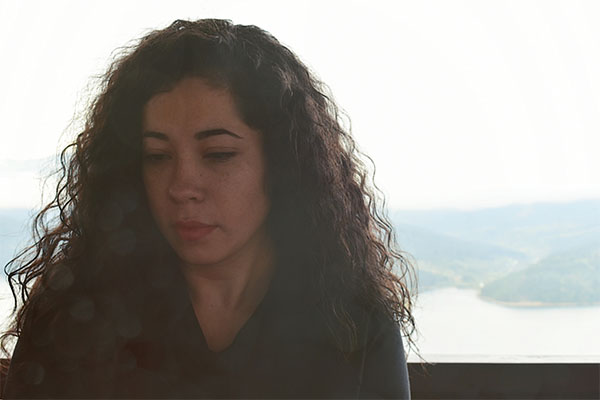
Bravery And Beauty: Success looks like perfection, but that’s far from the truth. Real success starts with surrender.
I should show you my planner right here.
That’s what I’m trying to say. It was when I rested in the idea that there was 1) Nothing that can keep me from the love of God and 2) Nothing that could somehow hinder his plan for my life. Our actions can definitely hinder, but the plan and the purpose never go thwarted. God’s plan and purpose remain intact. The way that we function and see it out is the thing that we have control of.
There were some areas in my life that I needed to heal before I stood on a stage, before I spoke on a podcast, and before I did whatever. Absolutely, but that was just timing. God was like, “I am ready. I got the plan.” Knowing God loved me and always had a plan and purpose for me made me work harder to be more whole because I want to be used by God. I want all of his plans and all of his purpose for me to see this side of heaven, so I’m going to try my best. It wasn’t from this “I got to be perfect” place. It was from this “I got to be close to God. I got to surrender to Him. I want it to be done in his way and his timing.” It unlocked everything in my life.
I know this is true for me. This is so in our culture, tidying ourselves up and perfecting ourselves. I know for me, I found that the more I try to fix myself and the more that I try to perfect myself, the more unwell I am. I was reflecting. I put a lot of energy into rebuilding my life after a very hard season. I have been working so hard to do everything that I can to try to be whole again.
I had this moment where I realized the more that I tidy myself up, the farther away I have been from Jesus. I reflected on my life, “When was I the closest to the Lord?” Some of our audience know my story. That was when I was eighteen, severely depressed, couldn’t eat, sleep, or talk, and was broken as a girl could be. It was in the psychiatric hospital that when I was completely broken, everything that I put my identity and my worth in was taken from me.
That is when I have been the closest. Even though I was so broken, in a way, I actually felt more whole than sometimes I can now when I’m trying to tidy myself up or put all the pieces together. I was actually in that time of reflection missing that nearness. It’s that verse, “Jesus is close to the brokenhearted.”
I like to say that our brokenness is a bridge to other people and one another, but our perfectionism is a prison that can separate us from each other. This makes me want to dive into the next part of our conversation. It’s become quite trendy in our culture to show all the ugly tears. You go on TikTok or YouTube and see these girls bawling and telling their innermost deepest secret.
I appreciate that it has become more of an opening culture, but at the same time, it’s important for us to have wisdom about what to share. I also want to talk about not all of us are called to share the most broken parts of our lives publicly. The other point is we don’t have to share those parts. Will you chime in on this conversation here?
Here’s a deal. I’ve always said this. We share from places of hope. That’s where we share from. We heal from, process through, and get into a safe community with our broken parts, but we share and lead from the hopeful parts. That can include being transparent about our stories and our situations. The things that I talk about so much of my past and that so much of my past were deeply broken, but I am talking about it and leading from it with a hope-filled posture because I’ve done my work. I think that’s the difference.
We have all seen the sweet little girl that is up on TikTok and Instagram live crying about her little relationships. She’s singing Drivers License. It’s okay, sweet girl. We know. No one feels more hopeful after that. We feel sorrowful. There’s empathy and compassion there. We’re like, “This is heartbreaking.”
What we should feel for people that are trying to share their stories publicly is a sense of hope. What happened to the story? What work did you do to overcome it? What parts of you did you recognize needed to be more healed, more whole, and sharpened? What we have to do with the wisdom that you’re talking about is take all of our broken parts and the preciousness that is our pain and share it in safe places with our people.
That’s what we want to do. We want to bring it to people that won’t leave the room, people that have the authority, the access to stay in the room and be in the room, and then the maturity to stay in it. From that place, when we begin to be more hopeful about our stories, that’s where we can lead from. The story is like, “Redemption has come. In those moments, I realized that I was closer to God.” That’s the stories that we want to hear. That’s the stories that lead the best. That’s where wisdom comes in. You got to place your stories in the right places.
I want to share a verse that goes with what we’re talking about. It’s Isaiah 44:22, “I have swept away your offenses like a cloud, your sins like the morning mist. Return to me, for I have redeemed you.” Let’s talk a little bit more about the beauty of redemption, what that does for us individually, and how that impacts the people around us.
Do you know what’s so interesting? When we read the Bible for real, it is like a Rolodex of redemption stories from the beginning of time. We see even the Israelites, God’s chosen people from the beginning who were exiled. They were slaves for hundreds of years, God rescued them, and then they worship cats and all kinds of other little weird stuff. God was still like, “I’m pursuing you and I want to come after you.”
When we think about the story of Jesus leaving the 99 to pursue the 1, when we think about the woman in John 8:1-13 who committed adultery, everyone’s expecting condemnation from Jesus, but he’s like, “I don’t condemn you.” When we look at the Apostle Paul, my favorite, we look at him being Saul, a Christian bully, taking out Christians. We look at him writing over half the New Testament, building the largest movement for the Kingdom.
The Bible is a Rolodex of redemption stories. God’s unique design from the very beginning of time before any of us graced the earth and had our fingerprints on this entire big story, before any of that happened, God was writing redemption stories, which means that’s who he is. If he’s omniscient and omnipresent, it’s who he is, was, and will always be. He is a master redeemer.
The Bible is a Rolodex of redemption stories. Click To TweetWe have to believe that fully and rest in that. When we start to believe that God is for redemption, we also start to believe that he does his best work in the redemption, in broken places that need light. From that place, hope rises from the dirt. We don’t need a whole bunch of hope when everything’s all jolly and we’re bopping around like Care Bears and Teletubbies. We hope when stuff sucks. I love what Dr. Curt Thompson says.
Let’s give a little plug to his work.
The Soul of Desire, The Soul of Shame, go and see it. He leads a confessional community group therapy that I’m in. He says this all the time, especially when it’s like a dark valley and everything sucks. He says, “Resurrection had no power without death. The lull and the pain of Saturday, Jesus tasted death and resurrection came because of it.” There’s no resurrection, redemption, or hope without death or without something dying.
There's no resurrection, redemption, or hope without death or without something dying. Click To TweetThat’s what we get to see in our lives. There’s the distress and hurt of the things that die in our life and the things that we have to grieve, but it’s the fact that redemption always comes. God is still working everything out for the good of those who love Him. Just like you said, Psalm 34:18 which you quoted, “God is close to the brokenhearted. He’s reviving those that are crushed in spirit.” In the very beginning of Genesis, where do we find the Holy Spirit and the Trinity? We find it hovering over the darkness, the raging seas, and the chaos. Where your pain is, you will find the presence of God. That’s good news.
What do you want to say specifically to the woman reading who is in the throes of it right now? You’ve been there, I’ve been there, and so many of us have been there. She’s looking at you right now. Redemption is not one-time. It’s not like we’re broken, and then one time we’re fixed. It’s a journey.
One of the writers for our women’s course put this in our course, and it always blows my mind. She said, “Hurt and hope can coexist.” For far too long, we’ve been under this weird assumption that we have to be 100% hopeful, everything’s going to be fine, the glass is half full, or we have to hurt. We are so much more complex than that. The world is so much more complex than that.
There’s this messy middle thing that we have to lean into and realize that we could absolutely be in what feels like the worst place of our life. We can be hurting in ways that our friends know and, in some ways, that our friends don’t know, in ways that we haven’t even been able to be honest about with ourselves, and hope can still live there. Hope can still live right there in despair.
Once we start to embrace that, as Brené Brown says, even the way our brains are wired, like our neural pathways, the little central nervous system in our brain that processes all our stuff, it is even designed to experience both pain and joy within the same wavelength. Meaning, if you decide, “I’m going to ignore my pain,” you inadvertently ignore your joy. You ignore your body and brain’s ability to process all the other emotions.
We were wired for pain and joy or hurt and hope to coexist for us to be absolutely okay, honest, vulnerable, and transparent about the things that take us out. When we start to do that, we open ourselves up for the opportunity to have more joy and more hope. I would say be open to holding both and watch how much more full your life becomes from that place.
What you’re saying reminds me of our friend, Katherine Wolf, who’s been our guest here. She speaks so well to the beauty of what is to come, the sorrow, pain, the hurt of what is now, and tension between joy and suffering.
One of the things that I’ve learned from her and other people that have been deeply heard or live in a state of suffering in some ways, is that we got to be careful that we don’t fall into the pain comparison trap. We don’t get to a place where we are either comparing our pain to other people and saying, “I can have it so much worse at my story. I don’t even need to say anything,” or looking down on others and saying, “They got it real bad” or, “I’ve got it so bad that no one understands.”
We can’t fall into the pain comparison trap. It robs us of our ability to 1) Think and believe that there’s actually healing and wholeness that’s available to us, and 2) Suffer well. It’s to be settled in our suffering and honest about where we’re at and being okay with that. I love everything that Katherine says. Hope really does heal. It has to be present. Hope is the reality and belief that things can get better. When we have the belief that things can get better, it changes everything. We fight a little harder. In the moments where we need rest, we take a little break and bounce back, but we have to believe that hope is available to us to get there.
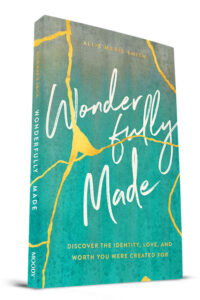
Bravery And Beauty: Falling into the pain comparison trap robs you of your ability to suffer well and believe that healing and wholeness is possible.
I love for this to be a place where we share stories. It’s for woman after woman who knows what it is like to come undone, to be broken, and to know the radical love of Christ that meets us when the world wouldn’t love us. Thank you for sharing your own story. I’m grateful that we get to share so many women’s stories of that as well. Do you have any practical ideas or tips, things that specifically helped you in your life and helped you heal that you want to share and encourage our audience with?
There is so much. One of the most helpful things was truly finding my people because I’m an extrovert. I love people. I was a girl who just had friends in every friend group. In middle school and high school, I was on the cheerleading team, but I was also on the debate team. I was in the Thespian Society but then I was also in the student council or program council. I was the girl that have friends in every friend group ever.
At first, I thought that was so powerful. I’m like, “I’m so light. I’m so loved. I have so many friends. This is awesome.” As I became an adult and started to go through hard things, I had to build friendship circles. I had to be very intentional about this because the truth is you cannot heal from the place that broke you and with the people that broke you in the first place.
Say that one more time.
It is very difficult to heal in the place and with the people that broke you in the first place. It just is. Oftentimes, we run back to the familiar because it’s comfortable, but sometimes God’s calling us to redefine. Even the spaces that we dwell in, the places that we go, the gyms that we work out at, the jobs that we have, the schools that we’re in, and the clubs that we’re a part of.
Sometimes when we’re healing, we have to start to redefine that. I define it as my friendship circle. The first little circle in the very middle is me and God, nobody else. That’s an intimate circle. Not even bae can be in that. Outside of that are the people that know my story deeply through and through, not only my story because everybody on social media knows my story, but the story that’s still being told.
Those are the people right outside my inner circle with God. They’re the people I call when there’s a deep depression going on, my anxiety is revving up, and I’m having dark thoughts. They’re the people that I am leaning into and bringing in close, and there are not many of them. Teenage Toni and college Toni thought that all 50 million of my friends were the good stuff like I had hit gold.
The truth is, the real gold and the real prize was having a selected few that knew God, that knew me, that were healthy enough, stable enough, and mature enough to hold what I had, to be confidential with that, and to tend to me in ways that I need it. Outside of that, you have some associates and people that you can have a sandwich with, and so on and so forth. You have your followers and all the things.
Here’s the truth, even Jesus had circles. He had the three disciples that he brought in super close. He had the other disciples outside of that. He had the teachers, the prophets, the synagogues, and all the people that he preached to. Even Jesus only brought some people really close because he knew that there were only a few that could handle his assignment, his purpose, and the plan that God has for him.
Somebody needs to hear this. There are only a few that can handle the plan and the purpose that God has for you, and that’s okay. It’s all good because we aren’t about to be popular when we get to heaven. We can throw that out the window because we’re only going to be praising one God. There’s no popularity for us in heaven. There’s popularity for God. It’s literally going to be like, eat, sleep, breathe, and Jesus. We might as well let it go now.
There are only a few that can handle the plan and the purpose that God has for you, and that's okay. Click To TweetI love what you said about your friendship circles. That’s something I have learned the hard way in my life, wanting to share my story from hopefully a place of hope, but then I don’t have this term called vulnerability remorse.
What’s that?
It’s like what we’re talking about where maybe we share something that is really sacred and holy. We share it with the wrong person or maybe in the wrong place. You come away from that, and you’re like, “That was sacred. Why did I share it with that person who I can’t trust?” I’ve had that happen in my life where I thought certain people could be trusted. I call them treasures because the messiness and the good parts are treasures.
They’re our story. They are sacredness in our story. I resonate personally with what you’re saying. I want our audience reading to find your people that are going to love you at your best and love you the same at your worst. It’s going to be messy, but it’s going to be beautiful and authentic. They are going to be your people. You are going to let them down, and they are going to let you down, but it’s safe. You can be brave enough to be broken in those spaces, and that is beautiful.
It is beautiful.
Toni, if you could go back and give yourself words of wisdom, how old would younger Toni be, and what would you say to her?
I’m going to cry. Dr. Allison Cook showed up at our group therapy one day and made me die crying. I was like, “Why would you do this?” Let me tell you why. It’s because she asked this question. She said, “What part of little Toni would you like to speak to?” It was thirteen-year-old Toni. Maybe I won’t cry now because I’ve talked to her about it twice, so then I feel like I’ve already gotten it out.
My parents were out of town coming back from Louisiana. It was the last day of school. There was a much older guy that now I know he’d just been preying on me and all the things. He and his friend came over to my house. His friend was sitting in the living room. He came into my bedroom, and that was the day I lost my virginity.
It’s interesting because I had healed but then also push that aside. I was a little bit wild. When I sat down to process deeply that moment and think about the thirteen-year-old girl who was in her bedroom, I really felt so dirty and ashamed. I didn’t even want to look at her. I was like, “You’re so dumb. You let this older guy come into your house. How stupid.”
Now, when I look at her, I realized that what she needed to hear was, “You’re still worthy. Even after this moment, laying down in your bed, and feeling so disgusting, you are so close to God, and he’s so close to you.” It’s like David said in Psalm 27:4 when wars are raging around him. When everything seems to be going so badly, there’s only one thing that he desires. It’s to dwell in the house of the Lord and to gaze at his beauty.
Right now, your heavenly father is gazing at your beauty. Not the beauty that you think it took and get this guy to come to your house, show you attention, and make you feel all special. No. It’s the deep inner beauty that he has put on you before you even graced the earth. I would have told her like, “It’s okay to tell someone so that they can remind you of this truth. Bring someone in, do not hide.” I just wish that thirteen-year-old Toni would have known that even then, there was a God that never left the room.
There has never been a moment in our lives when we have not been loved by the Lord.
It’s crazy because all of us are thinking now, “Lord, remember that one time.” It’s like, “No, even that moment.”
Who told me that is Christie, our co-host. She shared her story of all the hurts that she’d walked through. Pastors said this, and she knew this was the Lord speaking to her, “There is never ever been a moment when you haven’t been loved by me.” That’s our hope, that every girl and every woman tuning in will hear that. Jesus is the lifter of our shame, and that shame will be lifted. We’ll finally be free to walk in his light and wholeness.
That’s good news, girls.
Thanks for joining us. You can check out Toni’s book, Brave Enough to Be Broken. Thank you for showing up, being yourself, and bringing hope to all of us. Thanks, Toni.
Thank you.
Important Links
- Broken Crayons Still Color
- Brave Enough to Be Broken
- The Soul of Desire
- The Soul of Shame
- Katherine Wolf – Previous Episode
- Wonderfully Made: Discover the Identity, Love, and Worth You Were Created For
- https://view.Flodesk.com/pages/60eddc9bc92867fc75819353
About Toni Collier
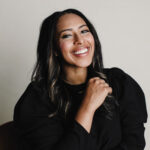 Toni Collier is a Hope Coach and the founder of Broken Crayons Still Color, an international women’s ministry that helps women process their brokenness and reclaim hope. She is a popular speaker and consultant who helps organizations with creative marketing, leadership, student ministry, and strategic planning. It’s her passion to show women that they can be both broken and beautiful as they work out their healing at the feet of Jesus. Toni also teaches regularly at Story Church Atlanta, founded by her husband, Sam Collier. Toni and Sam live in Atlanta with their daughter, Dylan, and new baby boy, Sam Jr
Toni Collier is a Hope Coach and the founder of Broken Crayons Still Color, an international women’s ministry that helps women process their brokenness and reclaim hope. She is a popular speaker and consultant who helps organizations with creative marketing, leadership, student ministry, and strategic planning. It’s her passion to show women that they can be both broken and beautiful as they work out their healing at the feet of Jesus. Toni also teaches regularly at Story Church Atlanta, founded by her husband, Sam Collier. Toni and Sam live in Atlanta with their daughter, Dylan, and new baby boy, Sam Jr

